 In honor of all the drug policy reform activists who worked so hard, but did not live to see the day of freedom and realization. They are true heroes of liberty and justice. Page 1: Don Topping, Cheryl Miller, Tom Crosslin and Rollie Rohm, Peter McWilliams, Genie Brittingham Erstad, Joe Hart, Ian Hunter, Robert Randall, Gil Puder, Jim Rosenfield |
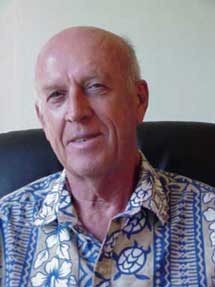 Don
Topping Don
ToppingMedicinal marijuana, advocate and retired University of Hawaii professor Donald Topping died June 29, 2003 at age 73. He had battled cancer for about 15 years. Born in West Virginia., Topping spent more than half his life in Hawaii. For 35 years he worked for the University of Hawaii as a linguistics professor and administrator. Topping also researched Micronesian languages, wrote and edited the Chamorro-English Dictionary and served as director for the Pacific and Asian Linguistics Institute and the Social Science Research Institute. Topping co-founded the Drug Policy Forum of Hawaii in 1993 and served as its president for 10 years. The group pressed for the legalization of medical marijuana and persuaded former Gov. Cayetano to back a bill to legalize medicinal marijuana in Hawaii. His use of medical marijuana led him to be one of the first people to "come out" in the Cannabis Consumers Campaign. "His last work was his favorite," his wife, Priscilla, said. He really liked "educating people about the dangers of drugs and telling them the truth." Topping believed that "everyone deserved to live in peace and dignity, and no one should be left behind," Priscilla said. "He's the kind of man who believed in the rights of the common person." Family and friends will scatter Topping's ashes at his favorite surf spot off Diamond Head. Services are private, but contributions in Topping's name may be made to the Drug Policy Forum of Hawaii. |
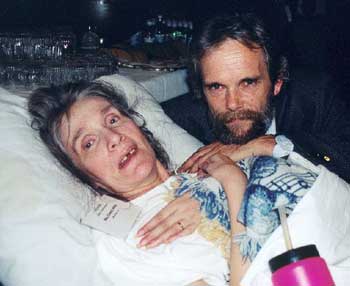 Cheryl
Miller Cheryl
MillerMedicinal marijuana activist and Multiple Sclerosis (MS) patient Cheryl Miller died June 7, 2003 from pneumonia and other MS-related complications. She was 57 years old. Miller, along with her husband Jim, was a tireless lobbyist in support of the legalization of marijuana for medical use. The issue was a personal one to Cheryl, who ate marijuana to alleviate symptoms of MS. By 1997, she had been strictly homebound by her condition for over 10 years, before she and her husband participated in that year's Boston-to-Washington "Wheelchair Crusade" for medical marijuana. Cheryl was called a "prop" of marijuana-legalization advocates by Rep. Bob Barr (7th Dist., GA) in October 1999, after her husband was arrested in the doorway of Barr's office in Washington, DC during a medical-marijuana demonstration. Capitol police, who broke up the rally and charged Jim Miller with demonstrating there, opted not to bust Cheryl also, who was lying next to her husband in Barr's office doorway, immobilized with advanced multiple sclerosis. They were protesting Barr's efforts to prevent citizens in Washington DC from having their votes counted on the 1998 medical marijuana initiative. In a posting to the Cherylheart Project website, husband Jim wrote the following tribute to his wife and best friend: "Cheryl made her life an open book so others could have a better life. ... She was never afraid of the consequences of what we did to help fight medical marijuana prohibition. She was afraid of being able to help seriously ill people, and not doing so. She was a teacher, and I learned from her. I am learning still. We must not mourn her passing without celebrating her life. Cheryl gave us a lesson that is ours to use or ignore. Don't be afraid of doing what needs to be done. You should however, be afraid of being able to do something, and not taking a swing. For a person that could not move her arms for many years, Cheryl took some pretty big swings. I will not let the example she lived go unused. She will be with me always." |

|
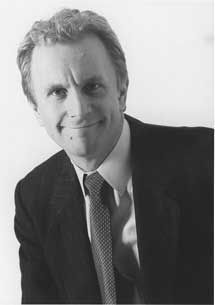 Peter
McWilliams Peter
McWilliamsPeter McWilliams was a best-selling writer and publisher of many self-help and other books. Among his best-known works are How to Survive the Loss of a Love, Life 101 and Ain't Nobody's Business if You Do. Having repeatedly pulled his life together after hardships and bouts with depression, he wrote books to help others rise above adversity. In March1996, Peter was diagnosed with AIDS and cancer, and felt that medical marijuana saved his life by making his days bearable and allowing him to take his other medications. The marijuana stopped his relentless vomiting, relieved the gut-wrenching nausea, restored his appetite and lifted his spirits. Peter told himself that if he lived, he would devote his life to getting medical marijuana to all the sick people who needed it. Well, Peter did live, and after voters passed Proposition 215, he decided to help patients obtain medical marijuana there in accordance with State law. Unfortunately, he ran amiss of federal law. With no legal defense in federal court, and facing a 10-year sentence, McWilliams pled to a lesser charge and got five years. While awaiting his sentencing, Peter was forbidden to use medical marijuana and choked to death on his own vomit. For this AIDS patient, the government's denial of the medicine that controlled his nausea became a death sentence. Some reformers consider his judge guilty of murder by judicial decree, since he had been advised in advance that McWilliams might die if deprived of medical marijuana. For more information, go to Human Rights and the Drug War or visit the McWilliams Memorial website: http://www.drugsense.org/mcwilliams/ |
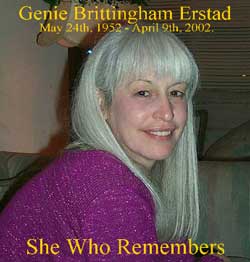 Genie
Brittingham Erstad Genie
Brittingham ErstadGenie Brittingham Erstad, known as She Who Remembers was a respected political activist, public speaker, hemp activist, friend, radio talk show host, and talk show archiver for Pacifica Network radio station 90.7 KPFK Los Angeles (Pacifica is 100% Corporate Free Public Radio). Genie collected and recorded these hard core underground audio archives for KPFK and distributed them herself on cassette under the name She Who Remembers for over 12 years. Her tenacious recording of events and radio broadcasts has been combined into an audio archive of wide scope and great value to researchers and historians, as well as being a point of interest and opportunity for anyone who cares about drug policy reform, industrial hemp, or a myriad of conspiracies. A collection of her works are still available online. Click here to find out more. |
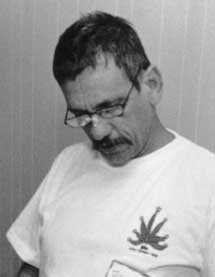 Joe
Hart Joe
Harthttp://www.angelfire.com/la/kaylee/joe.html Joe Hart was the coordinator of Medical Cannabis Key West, a highly decorated Vietnam veteran and recipient twice of the Purple Heart, five bronze stars and the air medal for service. Hart belonged to more than a dozen clubs that sold marijuana for medical use. He died from AIDS-complicated multiple myeloma at the Veterans Administration Medical Center in Miami on August 21, 1999. Joe Hart who was arrested by state and federal agents in 1998 for possession of medicinal cannabis with intent to sell. Approximately 25 state and federal agents smashed their way into his residence during the raid. Kay Lee, known affectionately as Grandma Lee, worked with Joe during hia last year at the Medical Cannabis Key West club. For more information about Medical Cannabis Key West or ways in which you can assist in its mission, please telephone Medical Cannabis Key West at (305) 293-1865. You can also visit its current coordinator Kay Lee's personal website or e-mail mrjah@flakeysol.com to be placed on her e-mail list. And to Joe Hart: Your mission continues! |
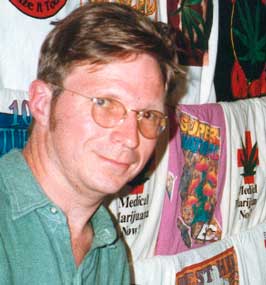 Ian
Hunter Ian
Huntern the early 90's, Hunter co-created Vancouver's early rave scene above the legendary dealer's café Crosstown Traffic and hosted a show on Vancouver Co-op Radio. With Dana Larsen, Hunter founded the short-lived Total Hemp Corporation in 1992. Hunter helped Marc Emery to found Hemp BC in 1993. Hunter also met Reverends Tucker and Baldasaro from the Church of the Universe -- members of which believe marijuana is the tree of life -- and was ordained. Later, Reverend Hunter split from the Vancouver crowd and moved to BC's capital city of Victoria, on Vancouver Island, where he founded a hemp store called Sacred Herb. The good Reverend Hunter shocked the Victoria scene with his vivid character. He popularized the term "4:20" by holding sacramental cannabis gatherings in the local park at that time of the afternoon. He also ran for mayor, endured arrest on cannabis charges and eventually challenged those charges as violations of religious freedoms enshrined in the constitution. Ian died in a boating accident. More about his colorful contributions to reform can be found at http://www.hempbc.com/articles/2654.html. |
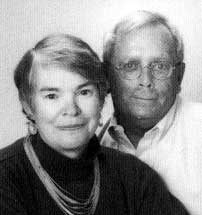 Robert
Randall Robert
RandallRobert Randall and Alice O'Leary, shown together here, were co-founders of ACT, Alliance for Cannabis Therapeutics, the first non-profit organization dedicated to reforming the laws prohibiting medical marijuana use In 1976, Randall made legal and medical history when he persuaded a federal court in Washington, DC, that his use of marijuana to treat his glaucoma was a medical necessity. At the same time, he petitioned the U.S. Food and Drug Administration for permission to legally use it. In November, 1976, Randall became the first person in modern U.S. history to obtain legal, medical access to marijuana. Randall's struggles launched the modern medical marijuana movement in the US. The federal government attempted to cut off Randall's supply in 1978, but he sued to be able to continue to use marijuana for his glaucoma-and won again. His victory compelled the federal government to establish the Compassionate Investigational New Drug, or "IND" program, under which he was able to gain access to a non-approved drug, namely cannabis. He continued to receive U.S. government-supplied joints until his death on June, 2, 2001. Randall was instrumental in the case which resulted in DEA Administrative Law Judge Frances Young's famous decision calling on the DEA to reschedule marijuana. He wrote numerous books, some with O'Leary, and worked to get the IND program extended to more patients. For more information, read this excellent article by Kevin Zeese. Send Rob Randall memorial donations to: Hospice of Southwest Florida
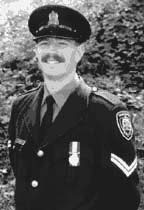 Gil
Puder Gil
PuderVancouver Police officer Gil Puder died of sudden cancer syndrome in 1999. Puder's life was changed when he shot and killed a street level drug dealer and realized that such deaths need not to happen at all. His battle against the war on drugs began when he wrote an article for the Vancouver Sun arguing that drug addiction is a public health crisis, not a law enforcement challenge. His book, Crossfire -- A Street Cop's Stand Against Violence, Corruption and The War On Drugs, by Gil Pruder, published by Douglas & McIntyre, Vancouver, was published in March 2000. The Chief of Police in the Vancouver Police Department was not happy and ordered him to have 'no contact with the media' unless it was authorized by him. Rather than concede to their threats, Gil went on to become a media figure, a champion of medical marijuana, and an award winning reform activist. You can see him in action in a series of online video clips. |
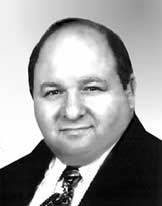 Jim
Rosenfield Jim
RosenfieldActivist, friend and computer wiz kid, Jim Rosenfield, passed away Friday, December 17, 1999, of a heart attack. His wife, Victoria says he died happy; doing the thing he loved most, ballroom dancing. Jim started Think for Yourself in 1992, to present voices dissenting from the official prohibitionist viewpoint, that we must suppress the use of drugs by criminalizing drugs users and trade in drugs. "Dissenting views have been suppressed through a powerful government-sponsored campaign of intimidation, demonization, ridicule and harassment. The World Wide Web now makes it possible to combat the government campaign and to present this material to all who are concerned," he promised. His forsight proved to be prophetic. He was one of the reform pioneers of the worldwide web, and with Cliff Schaffer, he conceived and published online the developed DRCNet, The Drug Reform Coordination Network, Think for Yourself, and the DRCNet DrugLibrary (World's Largest Online Library of Drug Policy). For more on his contributions, see http://www.drugsense.org/jnr/jrosenf.htm. |